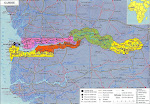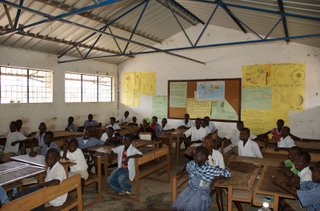Sorry you haven't heard in a month!!!!! but technology here is the pits!
The internet cafe's are super slow and not always working. I've lost so much time and so many blog entries and email messages over the past weeks. The laptop Ken bought me isn't supported in this country. That means that the flash drives can't be used to move photos or information either. (Or at least that neither I nor the Gambians know how!)
I hate to begin an entry by complaining about something when life here is soooooooooo rich. Just had another example of that. Here I am at an internet cafe that has some family connection to my kora teacher, Pa Bobo Jobarteh. Because of that, I was invited to have lunch. That meant sitting around a bowl with 7 other people sharing the palm oil. That's the name of the dish because palm oil is poured on it just before you eat. The food here is outrageous. Its incredients are purchased at market shortly before preparation. Everything is really tasty. I swear, the food here is a hidden treasure of the Gambia.
I have perhaps been the luckiest tourist in this country. I have three "families" who are all incredible. I have had a total of ONE tourist meal in 5 1/2 weeks and that was so I could meet a Swedish friend of a friend and also a friend of hers who is a musician from Maine who has been recording kora music here for ten years. I'm continually living with Gambians and seeing scenes tourists wouldn't even know they should want to see. I am now really ingrained with my teacher and his family. That's Pa Bobo Jobarteh. He is a real jali. I've read about jeli, Griot and jali for a while now, and although I knew he belonged to a jali family when I asked for lessons, I didn't realize that he's the 30 year old son who is loved by so many. Anytime we are in the car, people are calling to him or stopping him. As a Jali he not only is a musician, storyteller and keeper of history, but he's also a counselor and mediator. He's a person who has faith in others when most don't. He's a person who has earned the love of so many through so many selfless acts. Unfortunately, those qualities do not earn a living. Most of his living comes from performances - abroad. He'll actually be coming to the US to perform at the Global Health Conference in DC, May 26-30. Baring the unforseen, he'll be coming to Norry for a while after that. I know a few musicians who will love jamming with him and you'll all love him personally. He's positively delightful.
I'm hoping to also host his wife, Binta and 16 month (now) daughter, Mam Jarra. Last time he toured for 5 months, she was really young and by the tiume he returned had forgotten him as her father This stay will be about the same length, so I'm hoping to provide the chance for them to spend a week together. Mam Jarra has started calling me Mama Kumba. It's so nice. I love having children. His family, even the extended family, has welcomed me with open arms. His mom even calls me her daughter. NOW IF I COULD ONLY SPEAK THE LANGUAGE!!! I've got to work on that harder.
This Saturday, Pa is performing at the school where I work with the teachers. The school needs a kitchen in order to take part in the government's free food program. Pa wants me to have "African" hair (but not dreads) for the program since I'll be receiving my African name. I've been Kumba since my arrival. At first, I was Kumba Sarr because I lived with the Sarr family in Makumbaya. On weekends I'd visit Lamin Debo who is the teacher I'd met on the internet. His wife Matty is lovely and a terrific cook. Anyhow, Lamin knew my interests before I got here and with his "boy" (that means friend here!) Kaymo who has a car, were filling my weekend time. There I was Kumba Debo. Then I finally began my kora lessons with PA. It was an immediate connection. We're both totally open and honest and have the same concerns and goals in life. Two of his childhood friends, Boss and Modou, hang out with him most of the time. They're both in the band and are considered family. Then there are the two families. One is at the Jali Compound where his father, sisters and brothers live. The other is at his music school, Kaira Kunda. That's where his wife Binta is with Mam Jarra and Buntay, a nine year old daughter. That's where he gave me my own "house". A house is only two small rooms, a bedroom with a huge bed and a living room with little. Still, it means a lot to have my own space. Now, don't get the idea that this is a sexual thing. He is VERY Muslim. There is NO sex without marriage.
I started telling you about the Saturday concert, but got sidelined. At that concert I will be playing one song with him, but he will be talking about me and why my name from then on will be Kumba Jali Muso Jobarteh. A female jali is a jali muso, a male, a jali kay. Whatever he says, I know I'm being honored, although I fail to completely understand why. I'm nothing special. I love him, his family, his life goals and most of his culture. That's not really a reason. I'll have to find out when it happens what it all means. But the hair request is interesting. I know I'll have lots of things added to my hair and I don't think my hair will show at all. We'll see. I'm psyched. On the other hand, if the hair doesn't happen, I'll still be psyched and have a great time. I love the teachers I work with and love the idea that I could help Africans help themselves rather than depend on handouts from foreigners.
See you in six weeks, but hopefully, I'll write to the Blog more often.
Kumba Jali Muso Jobarteh
alias, Hope





